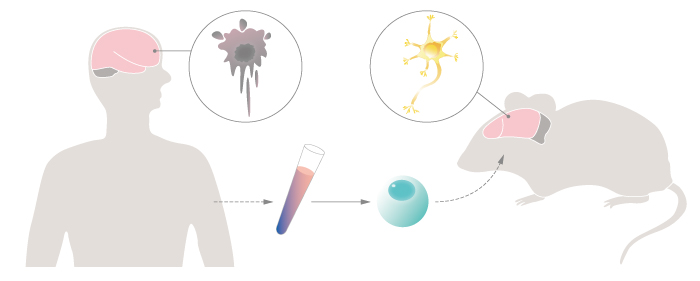
Research Activities
Research Activities
Publications
March 07, 2017
Patient cells can cure disease

Neurons in the brain of a Parkinson's disease patient degenerate, but neurons made from the iPS cells of the same patient survive when transplanted into mouse brain.
Parkinson's disease patients can be used to ameliorate the disease.
iPS cells create the possibility of treating a patient with his or her own cells. In the case of regenerative diseases like Parkinson's diseases (PD), however, because neurons already have a propensity to degenerate, neurons made from patient iPS cells may not be beneficial to the therapy.
"If the cells are diseased," said Tetsuhiro Kikuchi, a neuroscientist in the Jun Takahashi lab studying iPS cell-based therapies for Parkinson's disease, "then they could continue to degenerate when transplanted back into the brain."
PD can be categorized as familial and sporadic. In familial cases, a genetic mutation is known to cause the disease, but in sporadic cases there is no known cause. This difference made Kikuchi and Takahashi wonder if neural cells made from sporadic PD iPS cells would survive or degenerate when transplanted into the brain.
Kikuchi made iPS cells using samples from patients with sporadic PD and differentiated them into neural cells. The cells were then transplanted into the brains of rats suffering from PD-like symptoms. Kikuchi found the cells survived and functioned in the brains just as well as neural cells made from iPS cells prepared from a healthy donor.
"One of the biggest fears in cell therapies is the transmission of pathological α-Synuclein," he said. -Synuclein is known to misfold in the brains of Parkinson's disease, and this pathology can be transmitted between neural cells in a cell therapy.
Like neurons from healthy iPS cells, "we found that neurons from PD iPS cells cause no accumulation of pathological α-Synuclein," said Kikuchi. He added that this finding suggests there may be something toxic about the brain environment of PD patients, but longer study is needed.
A patient's own cells for a cell therapy are thought to be safest, because they should carry the least amount of risk for rejection. These findings suggest that for at least sporadic PD cases, the patient's own cells can be used for therapy. However, Takahashi cautions that, "We still need long term observation to conclude if patient cells are suitable."
Paper Details
- Journal: Journal of Neuroscience Research
- Title: Idiopathic Parkinson's disease patient-derived induced pluripotent stem cells function as midbrain dopaminergic neurons in rodent brains
- Authors: Tetsuhiro Kikuchi1, Asuka Morizane1, Daisuke Doi1, Keisuke Okita1, Masato Nakagawa1, Hodaka Yamakado2, Haruhisa Inoue1, Ryosuke Takahashi2, and Jun Takahashi1
- Author Affiliations:
- Center for iPS Cell Research and Application (CiRA), Kyoto University, Kyoto, Japan
- Department of Neurology, Graduate School of Medicine, Kyoto University, Kyoto, Japan






















